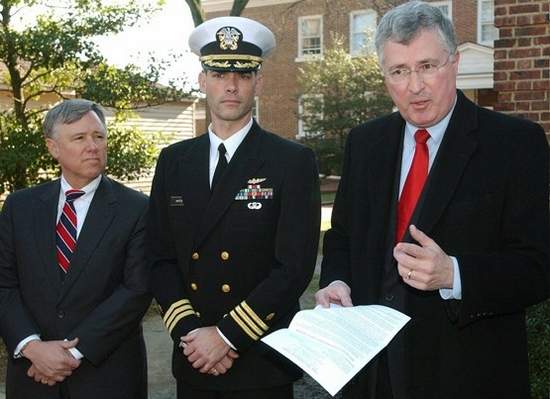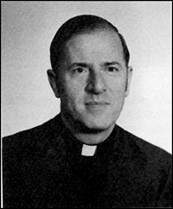Caseload from Tough Legislation Lighter Than Expected
By Beth Miller
News Journal
July 20, 2008
http://www.delawareonline.com/apps/pbcs.dll/article?AID=/20080720/NEWS02/807200370
In the year since Delaware adopted the Child Victim's Act, considered the nation's toughest law against child sexual abuse, three men have won financial settlements, public acknowledgement of their childhood abuse and apologies from the institutions that once supervised their abusers.
Ten other men, claiming abuse that occurred as far back as 1954 and as recently as 2006, are awaiting their days in court.
Considered a national model by some children's advocates and a dangerous constitutional precedent by some defense attorneys, the law eliminated the state's two-year civil statute of limitations in child sexual abuse cases and provided a two-year window — ending July 10, 2009 — during which cases previously barred by the time limit can be filed.
Other states now are watching Delaware as its law unfolds. So far, they've seen fewer cases filed than expected, but all with a common theme. Although the law applies to any type of child sexual abuse, every case filed so far involves men who say they were abused by Catholic priests. That's a statistical anomaly: nationwide, clergy account for less than 5 percent of perpetrators in reported child sexual abuse cases; nonclergy adults make up the other 95 percent.
 |
| Wilmington attorney Thomas Neuberger (right) talks with media earlier this year outside the Kent County courthouse with attorney Thomas Crumplar (left) and Navy Commander Kenneth Whitwell, who won a federal abuse suit against a priest in March 2007, and also settled in January with the Diocese of Wilmington. Photo by Gary Emeigh |
Though attorneys say they are preparing cases alleging abuse by school employees, family members and other nonclergy defendants, victims advocate Valerie Marek worries the two-year window is too short for victims who may want to file suit but are not yet ready for the trauma the process can produce.
"That's my biggest fear," she said.
About half the legislatures in the nation have reviewed their statutes of limitations since the scandal of clergy sexual abuse emerged nationally in 2002. Some have considered longer "windows" to give victims more time to consider the option.
California, the first state to open its courtrooms to cases previously barred by the statute of limitations, had a one-year window in 2003. Delaware doubled the time period.
Attorneys here say average settlements are tracking with those in California, where they ranged from $100,000 to $3 million. The only publicly announced payment here was $450,000 from the Catholic Diocese of Wilmington, named as a defendant in all of the 13 suits filed to date.
 |
| In 2007, the former Rev. Edward Smith was ordered to pay $41 million to Kenneth Whitwell. |
Marek, executive director of Survivors Of Abuse in Recovery (SOAR), said the "vast majority" of victims in her programs are women abused as young girls by adult men. She said the average victim goes more than 20 years without treatment. Some in that time have never told anyone what happened.
"The healing process is long for someone who has held this 20 to 30 years," she said. "This move to sue your perpetrator is going to be something we see toward the end of treatment."
Or, in cases of family abuse, maybe never. "It's really frightening stuff if you're going to court against your father," she said.
The law has opened the courthouse door, though, to those able to walk through it.
"Everybody is getting their day in court," said Wilmington attorney Thomas S. Neuberger, whose firm has represented all but one of the 13 plaintiffs. He expects to continue filing priest-related suits almost every week through the end of the year, and says he'll start on suits claiming abuse by others in 2009.
Hard times for U.S. dioceses
Nationwide, sexual abuse lawsuits have cost the Catholic church an estimated $2.6 billion since the national scandal of clergy sex abuse was exposed in a 2002 Boston Globe investigation. Several dioceses have declared bankruptcy. Others have reported a drop in donations.
Church officials say settlement money comes both from insurance and other church resources.
Timothy Lytton, professor at Albany Law School and author of "Holding Bishops Accountable: How Lawsuits Helped the Catholic Church Confront Clergy Sexual Abuse," believes the benefits of the suits may already have outweighed the costs: More than 1,000 child abusers have been removed from ministry, child-abuse prevention has become a top priority for churches and other institutions nationwide, crimes are reported promptly to authorities, seminaries are more attentive to psychosexual development of their students, and the claims of more than 5,000 victims have been publicly vindicated.
 |
| Since the new law has been passed, several cases have been brought against the Rev. Francis DeLuca. |
Laws such as Delaware's do three things to fix the problem, he said: They uncover critical information. They frame the issue as an institutional problem, not just an individual crime. And they put the issue on the public agenda.
"On balance, clergy sexual abuse litigation has provided benefits worth the cost," he said. "This is not a scientific calculation. How do you measure the damage to priestly respect, the loss to bishops' credibility? These are major social values and you can't reduce it all to numbers."
Of the $2.6 billion paid out, about half has gone to victims, 40 percent to attorneys' fees and 8 percent to treatment and prevention programs, Lytton said.
"That's a lot of money for lawyers and nobody should belittle that," Lytton said. "But keep in mind that, were it not for litigation, this problem would not have come to light and the church likely would not have addressed it. That money is what you have to pay to get a social good."
Attorney Mark Chopko isn't so sure. Chopko was the principal legal officer for the U.S. Conference of Catholic Bishops for more than 20 years. He advised church authorities on the clergy abuse situation and the legislative responses that emerged nationally.
Chopko said he and Lytton have agreed to disagree on their analyses of the cost/benefit of litigation. He said no one knows yet what the litigation has cost the church and its future. He pointed to Spokane, Wash., where the diocese has cut youth and Hispanic ministries and continuing education programs for clergy in order to pay bankruptcy claims.
"I think the transfer of more than $2 billion from exclusive devotion to public charity into the hands of private persons — where 40 percent goes to paying lawyers' fees — the removal of those resources from public charity, all of which was supposed to fund the growth and development and outreach of religious resources and Catholic dioceses around the country to educate, serve and heal — that's a tremendous impact.
GETTING HELP
The Legal Help Link, a service of the Delaware Civil Clinic, offers free assistance and referrals to those seeking legal counsel, according to Dana Harrington Conner, director of the clinic and a professor at Widener Law School.
The clinic is staffed by Widener law students, who will help callers determine if free legal aid is available or if a paid attorney with specific expertise is available. After the free referral, the first half-hour consultation is $35, Conner said, with proceeds going to the Delaware Bar Association.
The free clinic is located at Widener's Delaware campus. For more information, call (302) 478-8850.
The Legal Help Link, a service of the Delaware Civil Clinic, offers free assistance and referrals to those seeking legal counsel, according to Dana Harrington Conner, director of the clinic and a professor at Widener Law School.
The clinic is staffed by Widener law students, who will help callers determine if free legal aid is available or if a paid attorney with specific expertise is available. After the free referral, the first half-hour consultation is $35, Conner said, with proceeds going to the Delaware Bar Association.
The free clinic is located at Widener's Delaware campus. For more information, call (302) 478-8850.
"Whether you see a wounded church as a benefit or detriment is a point of perspective, but as someone who hopes for the vigor of that institution, I think this is a tremendous loss. I'm not saying people who have been hurt should not be compensated, that they did not deserve to be heard or that the continuation of the status quo in the 1970s and 1980s was beneficial by contrast. But things have gotten horribly out of balance in California and we haven't seen the final chapter in Delaware yet."
A long healing process
Abuse victims often tell no one of their experience for decades — one reason the state's two-year statute of limitations was eliminated — and some never do because of the stigma attached to sexual abuse, embarrassment, family considerations and other personal challenges.
The three men who have reached settlements in Delaware expressed gratitude when the agreements were announced.
"I am grateful for the bishop's actions as another step in my personal healing process and another step on my journey to justice," said Navy Commander Kenneth Whitwell, who settled with the diocese but still has claims pending against Archmere Academy and the Norbertine order to which his abuser, the Rev. Edward Smith, belongs. "I hope and pray that the bishop's actions offer some comfort and healing to others in Delaware whose lives and faith have been affected by these horrible crimes."
Chopko paints the legal process with less noble strokes.
"The litigation process is not about seeking truth," Chopko said. "It's trial by combat. If you're looking for truth and vindication, for everyone getting to a happy ending, litigation in the 21st century is not designed to do that."
But psychologists say it can be powerfully therapeutic for victims to sit across a table from their abuser as they are confronted under oath.
Perhaps most important is the vindication, the public acknowledgement of a horrific crime that was hidden or denied for decades.
That's what Mike Schulte said in 2006, shortly after the priest he says abused him — the Rev. Francis G. DeLuca — was arrested on similar charges in Syracuse and Wilmington Bishop Michael A. Saltarelli released DeLuca's name among the priests against whom the diocese had credible allegations.
"What I'm looking for on a personal level — there was never anybody with credibility who has said, 'Mike, we're sorry,' " Schulte said then. He filed a civil suit Wednesday.
Charles F. Gallagher III, the senior prosecutor in the Philadelphia District Attorney's 2003 grand jury investigation into abuses in the Philadelphia Archdiocese, fought unsuccessfully to get Pennsylvania lawmakers to pass a law like Delaware's.
"All the statute does is get somebody in the courthouse door," Gallagher said. "It doesn't win the case. ... If the civil law is passed, it will better educate the public that these men — and in some cases women — are still among us. In California and in Delaware, new perpetrators have been identified, and that's all we want."
Wilmington dentist Thomas Conaty said the law has made Delaware the safest place in the nation to be a kid. Conaty's son, Matt, founded the 200-member Child Victim's coalition that fought for passage of the Delaware law, then filed suit against a Capuchin priest and church officials in May.
"What Delaware had was a tragically flawed, antiquated law on the books and that led to the victimization of hundreds and thousands of children," Tom Conaty said. "The 144th General Assembly did the right thing, and today I think Delaware is in the vanguard of national movements to give civil rights back to children."
More than just churches
Catholic lobbyists have been the strongest opponents of legislation like Delaware's, a pattern Cardozo School of Law professor Marci Hamilton finds pitiful. Despite its high-profile posture in abuse cases in recent years, the Catholic church is not the crux of the matter, she said.
"The vast majority of victims are incest and family acquaintance victims," said Hamilton, who testified in support of Delaware's law last year and published "Justice Denied: What America Must Do to Protect Its Children" this year. "The hierarchy's lobbying against such reform and legislators' deference in some states shuts out of court millions of child sex abuse survivors that had nothing to do with the Church. The result is that we have millions of in-family predators preying on the most vulnerable under the cloak of anonymity because the state statutes of limitations are too short for the incest victims to get to court."
But so far, Catholic priests have been the focus of Delaware cases.
That may be for financial reasons, psychological reasons or societal reasons, said Dana Harrington Conner, a Widener Law School professor who serves on the Family Law Commission and reviewed Delaware's law before it was passed.
Media coverage of the clergy abuse scandal has been national, triggering memories for victims, but not all know the legal terrain has changed.
"A lot are just not aware of the law," said Conner, who has represented abuse survivors since 1994. "And this [idea] is controversial, but children will repress their memories. People don't want to believe it. But the majority are telling the truth."
The dynamics of incest are different, she said, and pursuing individual defendants may not offer the financial compensation that makes the emotional toll of legal action worthwhile to a plaintiff.
"That's a disincentive for the victim, who may say, 'I'll be put on trial. Why am I making this public?' " Conner said. "If there is no relief, that is a disincentive. Plus, the family may not believe them and they will be treated as a traitor. This was true of the church, early on, but more recently it has become more acceptable to sue a priest than it was in the past."
Dodging abuse accusations
Saltarelli, who will retire this fall after 12 years as bishop of the Delmarva Peninsula's 220,000 Catholics, declined an interview request by The News Journal for this article. Instead, he and officials with the Oblates of St. Francis de Sales issued statements expressing sorrow for the abuses of the past and outlining their efforts to enforce new policies designed to protect children in the future.
The three priests named in the settled suits all tried to avoid deposition. One left town just before the scheduled testimony, only to be summoned back by a judge. One invoked his Fifth Amendment right against self-incrimination more than 90 times before being compelled by a judge to answer questions. DeLuca's deposition was sealed from public view.
But medical and supervisory records have been produced that reveal the same pattern that emerged nationally — that of moving accused priests to new places, where their histories were unknown to parishioners and, sometimes, other church officials. Records also have shown that school officials — including some in positions of authority — knew of the priest's crimes, but did not act to protect others.
The Diocese of Wilmington has not followed all the national patterns, though.
Neuberger, a relentless pugilist who spares few words when describing the failings of his clients' opponents, was surprised by Saltarelli's approach as settlement negotiations unfolded. And, as might be expected, Neuberger's tone changed dramatically after the diocese settled its first two cases without putting either plaintiff through the rigors of deposition and cross-examination.
"The bishop is not following the scorched-earth policy of some other dioceses," Neuberger said. "The big surprise was that the diocese went down the avenue of restorative justice."
Steve Newton, a history professor at Delaware State University who converted to Catholicism about four years ago, has appreciated Saltarelli's recent approach.
"I'm sure there are cases where the diocese has not handled it as well," said Newton, who writes the Delaware Libertarian blog. "But the bishop has led the diocese in assuming responsibility for dealing with this issue ... I think creating that window and that exception was a good thing. I think the legislature crafted a really good compromise for attacking a really difficult problem."
Controversy isn't over
Delaware's law, authored by state Sen. Karen Peterson, D-Stanton, is not beyond attack. Though it has survived constitutional challenges so far, those battles may re-emerge on appeal.
Chopko hopes they will. He was among the church attorneys present before Superior Court Judge Robert Young in Dover last winter, when the constitutionality of Delaware's new law was challenged. Young ruled that the law did not violate Delaware's constitution, and the Delaware Supreme Court denied the church's request to review that decision.
"That's an issue that deserves to be decided — especially in light of the trial judge's remark that Delaware is in the minority of states, that most states that have faced this issue have found that such window laws are unconstitutional under their state constitutions," said Chopko, a partner in Washington-based Stradley Ronon Stevens & Young, which counts among its clients the Norbertine Fathers of Pennsylvania, defendants in the Whitwell case pending in Superior Court.
Such decisions set a precedent for future cases, in other words.
Chopko said he hopes the years of anguish will produce some real and lasting benefit.
Tom Conaty, whose son has filed a suit, believes Delaware's work will promote that very thing.
"This is going to spread," he said. "It will take a little while — there are lots who don't want this to come to their states. But I think in Delaware, where we all know each other and respect each other and listen to each other — that's the good part of Delaware. That's how we got this done. I'm very proud."
Contact Beth Miller at 324-2784 or bmiller@delawareonline.com
Any original material on these pages is copyright © BishopAccountability.org 2004. Reproduce freely with attribution.